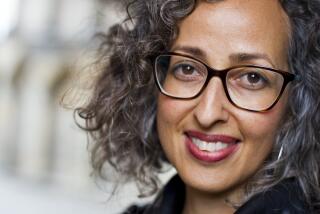Book review: ‘The Tenth Parallel’ by Eliza Griswold
- Share via
Blame it on the “tsetse fly belt” dividing north and south Africa. Or the schizophrenic monsoons in Asia. Blame it, Eliza Griswold suggests, on overweening hubris and nearsightedness. But don’t blame the cultural divide between Islam and Christianity on those “whose faith is bound to their struggle for resources and survival.”
In “The Tenth Parallel: Dispatches From the Fault Line Between Christianity and Islam,” the acclaimed journalist and poet details her experiences over the last decade within what is referred to as the “Torrid Zone,” a politically fraught region that is home to 60% of the world’s entire population of Christians and 50% of all Muslims. It is also the birthplace of the modern conflict between Islam and the West, the author tells us. Far more than a travelogue, her book is a richly textured fugue that dramatizes the dizzying interplay between notions — faith, morality, identity — and nations.
Griswold’s “10th parallel” refers to a latitudinal line separating Africa’s mostly Arabic Muslim north and black Christian south — and, moving east, the largely Christian Philippines and Muslim Indonesia. Yet the author deftly uncovers infinitesimal parallels between warring ideologies: martyrs and mass tent revivals, the call to return to “fundamentals” and a revolving cast of proselytizers fighting for converts among “border pagans.” Take, for instance, Islamic reformer Uthman dan Fodio’s 18th century southward advance — effectively halted by sleeping sickness. Or, in the same part of Nigeria in 1904, the German Evangelist Hermann Karl Wilhelm Kumm’s efforts: “Kumm took two hundred African Porters and their families along with him, confident that he would convert them to Christianity during leisure hours. The party never stopped walking.” Rather, they “hacked their way through dense bush woven with wet vines … the party fell victim to flash flood. Kumm and his expedition basically swam across Africa.” The scene recalls Werner Herzog’s 1972 film, “Aguirre: The Wrath of God.”
As if operating a metal detector rigged for the uncanny, Griswold reveals the familiar in the strange, and vice versa. She visits Kaduna, a Nigerian city divided by the 10th parallel, and its opposing neighborhoods of Little Afghanistan and Television. She watches the evangelist Franklin Graham proffer a Nike shoebox full of Christmas toys to a dying baby in Khartoum; the infant is no bigger than the pastor’s hand. She finds, among other war criminals, a Jihadist-cum-medicine man with ties to Osama bin Laden, only to hear John Lennon’s “Imagine” chiming from his headphones. He makes it past airport security with a pair of bunnies for his son. “Will the X-ray machine kill them?” he asks. A rhetorical question.
If Griswold’s insight is surprising, it’s because, as the daughter of an Episcopalian bishop, she knows that the greatest parallels between Christianity and Islam are the divisions within. Where Protestant leaders like her father saw progress, evangelists like Graham see damnation. One of the author’s harrowing treks, then, involves being forced to reveal her “background” to Graham’s camp outside of Bashir’s palace in Khartoum.
Griswold is, above all, a poet with a keen sense for words and a reporter in tireless pursuit of their meanings. En route to an interfaith wedding in Malaysia, a Muslim country in which Christian use of “Allah” has been angrily and violently disputed, Griswold occupies the children who are passengers with a round of hangman. Which word to inscribe? her allusion begs. Whose interpretation? If the dotted line here marks major gaps in understanding, it also conjures a verse from the Koran — one that echoes the Bible and opens “The Tenth Parallel”: “Father, forgive them, they do not know.”
The book illuminates complex relationships, even as the author herself admits she does not understand them. “People’s professions of their beliefs,” she writes, “were ultimately mysterious, and could not be explained away by self-interest, or anything else of this world.” It seems that faith, a supernatural resource, is a motivating factor as powerful as oil or water.
Given our world today, Griswold’s book is as timely as ever. These dispatches are an urgent call — not simply to overlook differences but rather, as she puts it, “to engage, engage, engage.”
Cline is a writer and editor in Los Angeles.
More to Read
The biggest entertainment stories
Get our big stories about Hollywood, film, television, music, arts, culture and more right in your inbox as soon as they publish.
You may occasionally receive promotional content from the Los Angeles Times.










